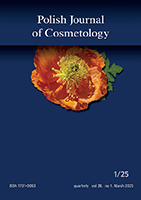search by
Copyright @ Pol J CosmetolMicrobiological research of products of biotransformation of teaDaria Kaczmarczyk 1,2/, Stanisław Lochyński 1,2/ 1/ Zakład Chemii Bioorganicznej, Wydział Chemiczny, Politechnika Wrocławska 2/ Instytut Kosmetologii, Wyższa Szkoła Fizjoterapii we Wrocławiu Summary Background. Recently, many reports can be found proving that tea has a beneficial influence on human organism, mainly by its actions: regulates digestive system, strengthens walls of blood vessels, or boosts concentration. It has been known and used in China for ages as invigorating and detoxicating elixir. Kombucha consists of symbiotic consortia of nonpathogenic bacteria and yeast. It is a product of fermentation utilizing tea and sucrose. Its potential beneficial action and possibility of introducing in many industries have recently drawn attention of many researchers. Aim. The aim of this research was analysis of microbiological content of tested products as well as estimation of number of grown microorganisms present in kombucha. Material and methods. Green tea based kombucha was chosen as research material. Growth was conducted in room temperature and low light exposition. The following media were used for microorganism growth: potato dextrose agar, DRBC and Hestrin-Schramm. Results. The optimal growth time for all used media was roughly around 7th day of kombucha´s growth cycle. Preformed inoculations yielded a number of strains, which were passed to Leibniz-Institut DSMZ to be identified. Conclusions. Despite the rapid development of contemporary medical sciences, people still lean towards alternative methods of boosting health and physical disposition. Results gathered during this research can contribute to extended use of aforementioned natural products. Key words: tea, kombucha, bacteria, yeast |




